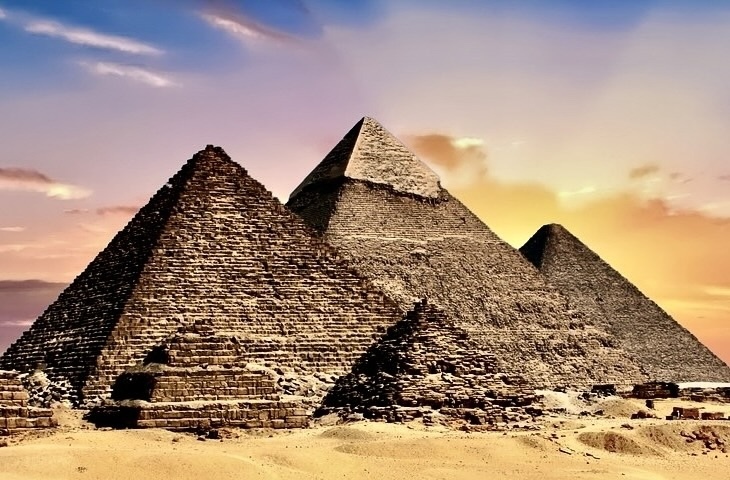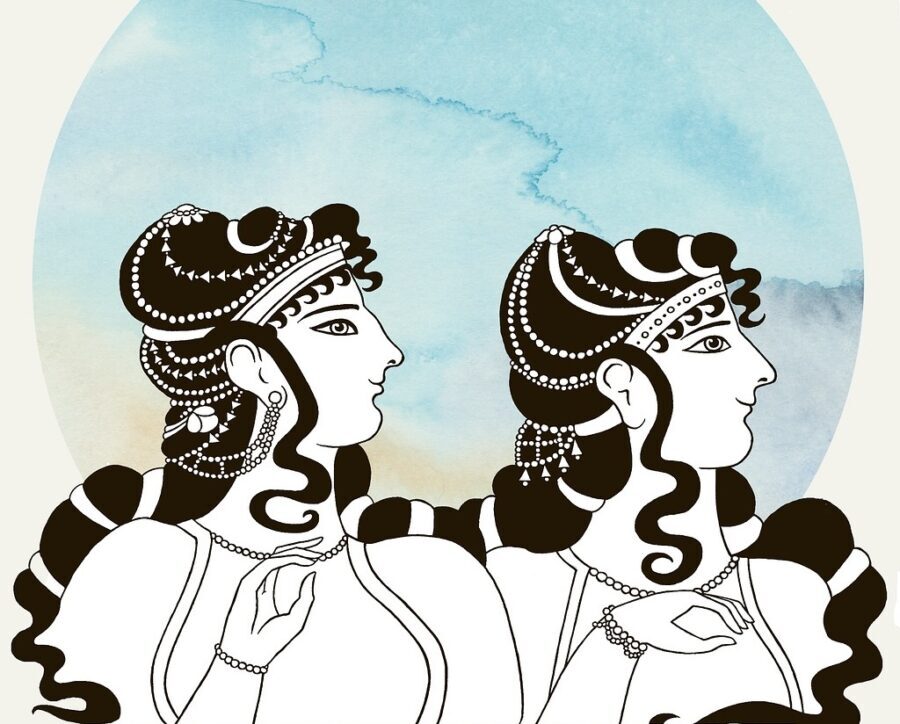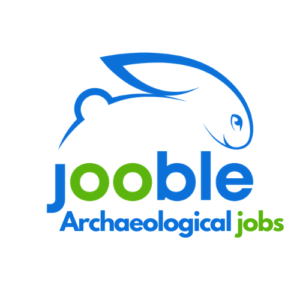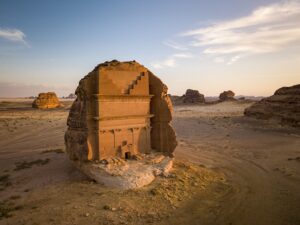
Our past is at risk. Its tangible remains are fragile, a non-renewable resource that, globally, is disappearing daily at the hands of urban development, natural disasters, climate change, and illicit trade in antiquities.
The risk to our past makes preservation work all the more critical. That’s why AlUla is proud to have documented 30,000 archaeological sites in the region, including Hegra, the Nabataean’s ancient southern capital in modern-day Saudi Arabia. The archaeological wonder sits among AlUla’s breathtaking landscape, rich history, and local hospitality, making it an attractive destination for visitors. But the importance of preservation means that, in reality, beyond Hegra, only seven of those 30,000 sites are open to the public. Protecting our past means we must keep a laser focus on balancing visitor accessibility with preservation.
My life’s work is dedicated to archaeological preservation of sites like Hegra because protecting our past is the key to securing our shared future. Only by understanding the past— by understanding who we are and where we came from —and applying this knowledge to our present——can we effectively shape our future.
The continued relevance of archaeology was a prominent theme at the inaugural AlUla World Archaeology in September 2023. The global archaeological community agrees that we must, with urgency and focus, re-double our efforts to ensure the preservation of our past and, thereby, secure our shared future. The question is: How?
Local communities are the answer. Local communities are the frontlines of preserving the past and the most critical factor in determining the sustainable success of an archaeological site. As Vice President of Culture at the Royal Commission for AlUla (RCU), it is my privilege to work toward the RCU’s top priority: that the people of AlUla—those who first created and now preserve its rich cultural heritage—remain at the heart of AlUla’s development. If any archaeology project in AlUla is not oriented towards the local community, it is not a project for us.
With local community empowerment and development as our North Star, three supporting principles drive AlUla’s approach to archaeology.
First, we will not undertake any projects without the participation of Saudi archaeological students. In Saudi Arabia, archaeology is still an emerging field. At Dadan, for example, one of the earliest kingdoms on the Arabian Peninsula, we have excavated only 6% of the entire site because we lack the human resources to move forward at a faster pace while ensuring proper preservation. We need to train a new generation of Saudi archaeologists to manage excavations—a task only accomplished by giving them hands-on experience with ongoing work. With greater local expertise, we will be able to discover the depths of the rich cultural heritage of AlUla and beyond.
Second, we facilitate local students to visit the sites. Students ranging from 6 to 12 years old come from local schools to learn about the history of their land. With that comes heightened self-understanding and a deepened sense of pride. These students carry themselves differently when they leave. But we also have greater hopes for our students in AlUla: We want to expose them to the field of archaeology. As they watch the excavations, learn about their history, and experience the richness of the landscape, we hope to inspire the next generation of archaeological students.
Finally, we prioritize training and working with local guides—or Rawis, as we call them. The Rawi, or storyteller, has a special place in Arabic culture. Historically, Rawis were entrusted with preserving the past through oral traditions—recounting history, poems, and literature—that were passed down over generations. Today, AlUla is working with local Rawis—tapping into their cultural expertise as guides, translators, and cultural ambassadors for visitors to AlUla—to ensure that the local people remain in control of their own narrative as they pass on the history of their community.
We work closely with Rawis each season to update their site knowledge based on the latest discoveries and to enhance their skills—from communication, planning, and logistics to actual archaeological preservation—all while further equipping them for intercultural dialogue with visitors from around the world. As our local Rawis gain a deeper understanding of the archaeological process, local ownership of the site increases exponentially, driving sustainable preservation efforts by and for the local community.
What happens ultimately when we successfully integrate the local community and these three principles into every dimension of our work? Our local communities gain much more than jobs. While economic opportunity is important, our people also gain an awareness of the historic value of their land and culture; they swell with pride about the people they come from and those they’ve become; and they develop a sense of ownership in their cultural assets. They become the frontline advocates of archaeology, the first protectors of their history.
The people of AlUla themselves are those who guarantee that the rich cultural heritage of AlUla will be around to the thousandth generation. They have served as guardians of their cultural heritage already for millennia, and the RCU remains committed to ensuring that the people of AlUla remain at the heart of its preservation. After all, the past doesn’t belong to academics, historians, or archaeologists. It belongs instead to the people whose past it is—and to their children’s children. Only by engaging them in the past and entrusting them in the present can we ensure the preservation of their heritage into the future.
______________________________
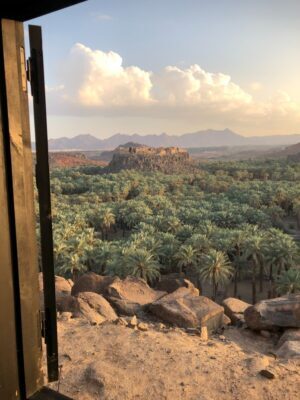
Khaybar is a major oasis in northwest Arabia, characterised by fertile spring-fed wadis, filled with date gardens, cutting through the basalt geology, with ongoing archaeological investigations of its Islamic past. Credit Royal Commission for AlUla
______________________________
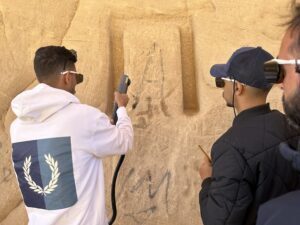
Laser Graffiti Removal Workshop programme training for Royal Commission for AlUla personnel at Hegra, in collaboration with Centro Conservazione e Restauro La Ventaria Reale. Credit Royal Commission for AlUla
______________________________
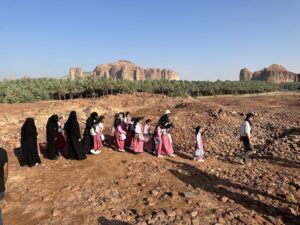
School children visit the active archaeological site at Dadan, the ancient Kingdom of the Lihyanite and Dadanite civilisations. Credit Royal Commission for AlUla
______________________________

The largest tomb at the UNESCO World Heritage Site of Hegra, the monolithic Tomb of Lihyan Son of Kuza. Credit Royal Commission for AlUla
______________________________
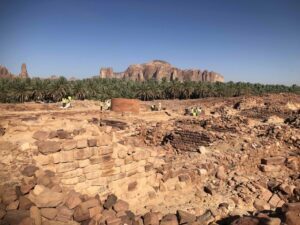
Dadan is one of the most active archaeological sites in AlUla, with excavations ongoing in several key areas. Credit Royal Commission for AlUla
______________________________
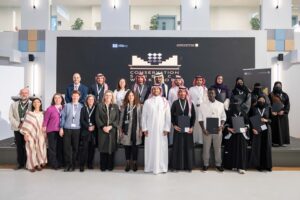
Student award ceremony for completion of the Conservation Science Workshops programme run by the Centro Conservazione e Restauro La Ventaria Reale in collaboration with the Royal Commission for AlUla. Credit Royal Commission for AlUla
______________________________
Article Source: Royal Commission for AlUla news release
Advertisement
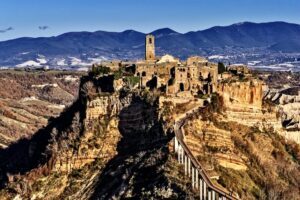
EXPLORE THE ANCIENT ETRUSCANS IN PERSON!
Experience a unique, up-close-and-personal hike among ancient hilltop towns in central Italy. You will walk the sensational countryside of the regions of Umbria and Tuscany, soaking in important sites attesting to the advanced Etruscan civilization, forerunners of the ancient Romans; imposing architectural and cultural remains of Medieval Italy; local food and drink; and perhaps best of all — spectacular scenic views! Join us in this collaborative event for the trip of a lifetime!

